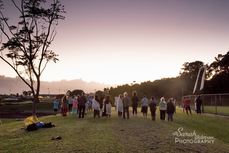 Makahiki runners greeting the sun. (Photo: Sarah Anderson)
Makahiki runners greeting the sun. (Photo: Sarah Anderson) For the last 15 years Makahiki has been celebrated by students and staff at Kanu o ka ʽĀina School, growing into a community celebration at Anuenue Playground in Waimea 10 years ago. And for the last two years, a circle island relay run organized by Lanakila Mangauil has brought new life to the traditional procession practiced in the past.
All travel kapu, or restrictions, are lifted during Makahiki, meaning folks could travel to other districts and villages to socialize and participate in competitive games, an essential part of the celebration. “Everyone dressed in their best. It was like the time when the birds start to show off, you flaunt your feathers. It was a time of expo and everybody was showing off their best. Farmers, fisherman, craftsmen, hula, chants … all of that. You bring the best of the best,” says Mangauil.
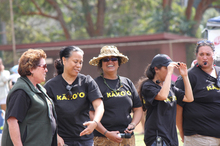 Auhea Puhi, Malia Nae’ole-Takasato, Keala Kahuanui, Nicole Anakalea and Pomai Bertelmann. (Photo, Nancy Erger)
Auhea Puhi, Malia Nae’ole-Takasato, Keala Kahuanui, Nicole Anakalea and Pomai Bertelmann. (Photo, Nancy Erger) “Different teachers and organizations ask me to come and teach about Makahiki. When you explain that these are games that our kings and queens have played for hundreds of years, that they are more than just rolling a stone or throwing a spear and how these games teach you lessons like focus and intention, they start to take you really seriously,” says Kahuamui.
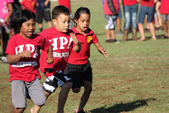
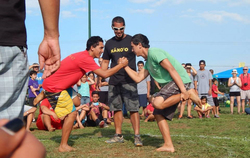
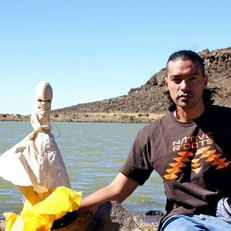 Lanakila Mangauil with Lono image.
Lanakila Mangauil with Lono image. “The chiefs would come around and collect their taxes. But really that was an observation. When the chiefs did a circuit of the island, what they were really doing was looking at the productivity of each district. The chiefs would select what they wanted and in a gesture they would give everything back to the people,” says Mangauil.
Inspired by the prayer runs of Native American Indian tribes, Mangauil decided to bring the Makahiki procession alive with a run around Hawaii Island, focusing on the health of the land and the people. “It's about best practices. What did they do back then and how can we apply these things today?” says Mangauil.
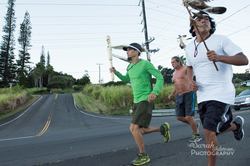
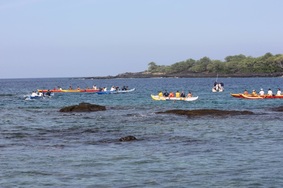
Canoes from Miloli'i and Keoua carried the Lono from Miloli'i to Kealakekua Bay. (right)
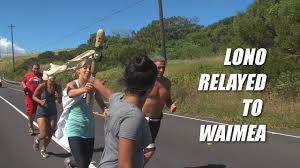
The Lono traveled into Hawaiian Homes escorted by many school groups and out to the highway on Mana Rd, stopping for lunch at Hale Kuhio, compliments of Aha Punanaleo Preschool. “All the parents and the kids were lined up and the first person to come out of Hawaiian Homes passed the Lono to the first little guy and he ran it all through the parking lot. They handed it off and the parents kept it going,” says Mangauil.
Although we can never return to the time of the ancients, they have provided us with all the knowledge and wisdom necessary for the land and the people to thrive. Weaving traditional practices into contemporary life, creates a guide to healthy wholesome living that sustains the natural world we depend on for our survival.
 RSS Feed
RSS Feed
